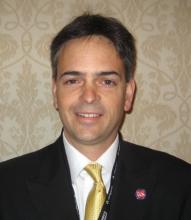LAS VEGAS – Oncologists need to take a leadership role in crafting the practice changes that will be driven by the Patient Protection and Affordable Care Act, two key stakeholders said at the annual Community Oncology Conference.
"The silo mentality of just staying within the four walls of your practice and working harder – that will not work," said Dr. David A. Eagle, an oncologist in Mooresville, N.C., and president of the Community Oncology Alliance. "Really, there is a need for all of us to come together and find these solutions."
The act includes several cost-control measures that will affect community oncologists, including accountable care organizations, an independent payment advisory board, and bundled payments, whereby providers are given a fixed fee for an episode of care.
Implementing these measures will need to address patient heterogeneity. "As all of us who take care of cancer patients know, one patient with stage IV lung cancer can be vastly different than another patient with stage IV lung cancer," he said.
The Community Oncology Alliance was instrumental in getting on the books the National Quality Cancer Care Demonstration Project Act, which is part of the new law and rewards treatment planning, care coordination, guideline adherence, and survivorship planning. Oncologists already do many of these things daily; they will now be rewarded for demonstrating that they do them, Dr. Eagle said.
Additionally, plans are under way to take these efforts to the next step, by adding the concept of the oncology medical home, which would provide value to patients in terms of comprehensive care and to payers in terms of interventions that cut costs by avoiding hospitalization and emergency department use.
Increased measurement of performance and outcomes will become mandatory. "We are going to need to determine what is measured and set appropriate benchmarks and then demonstrate to payers and others how we are doing," Dr. Eagle said. As "accountability should be a two-way street," all parties involved in care-related activities, including payers and pharmacies, also should have their performance measured.
To address these issues going forward, Dr. Ira M. Klein, senior medical director with the health insurer Aetna in Hartford, Conn., proposed collaboration between providers and payers built on the use of mutually accepted evidence-based clinical pathways.
This collaboration would streamline care by coupling technology such as electronic health records with evidence-based medicine, would reduce hurdles such as prior authorizations, and would reward integrated care using the medical home model that, for example, averts unnecessary hospitalizations.
"The biggest issue is the wide variations in care that are going on and the use or nonuse of evidence-based guidelines, including technology. Those are things that are driving up costs." The current system mainly rewards drug therapy, hospital stays, and radiology procedures rather than guideline adherence, services that give a better holistic patient experience, and the difficult but critical tasks such as end-of-life counseling, he said.
Ideally, physicians would retain control over the guidelines, and practices would retain control over their work flow, according to Dr. Klein. And the new processes and software would be introduced gradually given that practices are already stressed by stagnant revenue and other factors.
"We want to take the costs of cancer care and move those costs into revenue streams for providers for doing the right thing in an efficient system," he said. Presently, a lot of money is spent "on oral oncolytics that get thrown down the toilet and hospital stays that happen because an oncologist is incredibly busy, just doesn’t have the ability to make the extra slot (in the schedule), or a private place to give an infusion or hydration – the things that we know we can do but we don’t do today because the system won’t let us."
"We think that we can save millions if not billions of dollars in the system, improve patient care with you, and also use this as a national social experiment to find out what health care could be by aggregating and reporting the data, doing the wonderful things in medicine that have happened in some other areas – eradicating some types of communicable diseases, reducing the mortality in pediatric leukemias and lymphomas – things that we know we can do when we all work together to share the data and move together to the same end point," Dr. Klein concluded.
Community Oncology and this news organization are owned by Elsevier.


